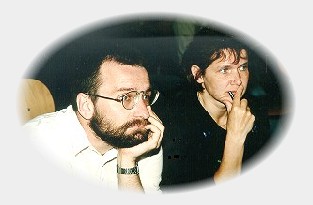The International Seminar «Oral History as the Reflector of
Societal Change and Emerging Cultural Differences and Values»
May 11 -13, 2000 University of Tartu,
the Chair of Estonian and Comparative Folklore. Projekt coordinator
Ph.D. Tiiu Jaago.Supported by Open Estonia Foundation grant no.
E00-3.01-03-02-03.
In today's society it is important to
understand the (social, ethnic, occupational, etc.) idiosyncrasies of
minorities, their adaptation at a certain point of time in a certain
cultural area, because society is oriented to integration, not the
assimilation of ethnic minorities. Each geographical region is also a
region with unique and distinctive historical experience. At the end
of the 20th century man perceives his uniqueness and also the need to
share his knowledge with the rest of the world. The Estonians, like
other nations from the former Soviet Union, are driven by something
else: they feel the need to talk about things they were not allowed
to talk about before. «This is real life, not history,»
said a woman who described me the events of World War II in Tartu.
The main goal of the project was to
organise an international interdisciplinary seminar on oral history
in Tartu, on the following reasons: 1) the cultural research of the
1990s has resulted in numerous studies in Estonia and its
neighbouring countries, and it was time for comparing and
generalising these isolated works; 2) researchers from different
fields of science have studied individual biographies, which reflect
the narrators' past experience, but it is not known what conclusion
could one or another field of science draw from these stories; 3) the
practical need for generalisation arises from the topicality of the
subject (life story days, family days, research into genealogy,
seminars on curing souls; integration and social politics; university
curriculum, etc.); it is also important to standardise terminology.
The English term 'oral history' has no counterpart in the Estonian
language, in my opinion it should be translated as 'pärimuslik
ajalugu' (heritageted history), since written narrative history
has occupied an important place in the Estonian tradition (unlike the
tradition of the United States, the birth place of the term 'oral
history') and there is no reason for distinguishing the oral history
from the written forms of history.
On May 11, Rutt Hinrikus (scholar of
literature and the chairperson of the society Estonian Life
Stories «Eesti Elulood») gave a presentation of the
collection and the publications of life stories in the archives of
the Estonian Literature Museum. The collection «Eesti Elulood»
volumes I-II attracted particular attention and approval.
Reports delivered on May 12-13 could be
divided in three thematic groups: (1) the peaks of human life in the
late 20th century oral history; (2) the oral history of social and
ethnic minorities (biographies of the deaf, for example); (3) the
oral history concerning recent historical events. Adopting a foreign
culture and language is possible only through understanding one's
own.
A genealogical study of school children
from Maardu and East-Virumaa «Who am I?» conducted by
Reet Filippov and Karin Undrits was presented. The genealogical study
treated the self-identity of Estonian Russians. On the basis of the
study, Merle Karusoo has staged a performance.
The seminar concluded with an unusual
sightseeing tour in Tartu guided by Kalev Jaago, the archivist at the
Estonian History Archives. He introduced Tartu from the viewpoint of
oral history, connecting the sites with certain people.
The electronic version of the seminar
proceedings «Pärimuslik ajalugu» in Estonian and
Oral History as the Reflector of Societal Change and Emerging
Cultural Differences and Values in English. is available on the
address
http://haldjas.folklore.ee/UTfolkl/korraldatud/PA2000. A
collection of seminar proceedings in Estonian and English will be
published in 2001.
Tiiu Jaago, Tartu

Kalev Jaago and Tiiu Jaago. Photo by
Arvo Tarmula 2000.